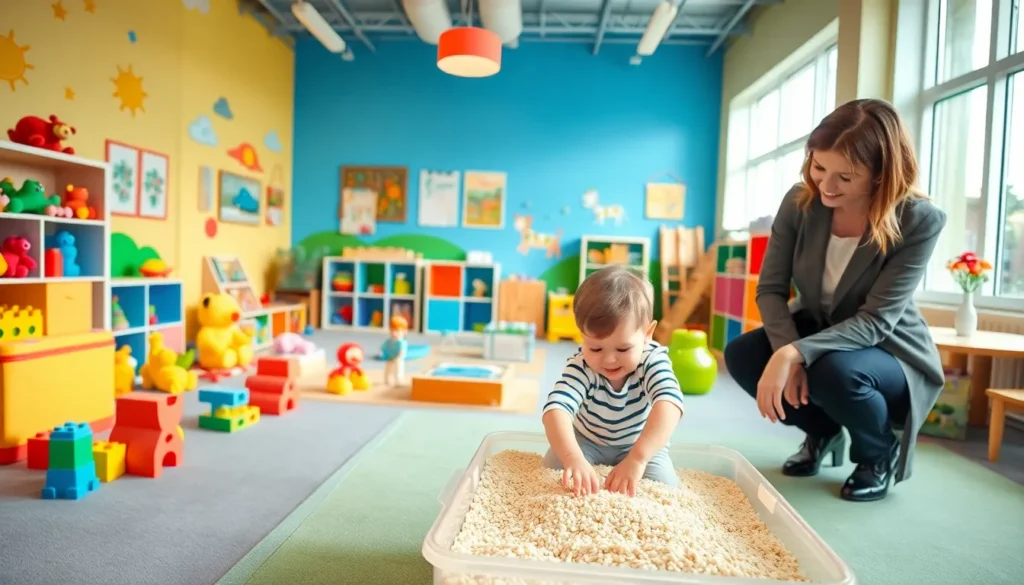Navigating a co-parenting relationship can be challenging, yet it’s essential for the well-being of children. When parents separate, maintaining a healthy partnership is crucial to ensure kids thrive in both households. Effective communication and mutual respect can transform a potentially difficult situation into a supportive environment for everyone involved.
This article explores practical tips for fostering a positive co-parenting relationship. From setting clear boundaries to prioritizing the child’s needs, these strategies empower parents to work together harmoniously. By embracing collaboration and understanding, co-parents can create a stable foundation that benefits their children and eases the transition for all parties.
Table of Contents
ToggleUnderstanding Co-Parenting
Co-parenting refers to the collaborative effort between separated or divorced parents to raise their children effectively. This partnership requires ongoing communication, understanding, and commitment to the child’s best interests.
Definition of Co-Parenting
Co-parenting involves two or more parents sharing the responsibilities of raising children while navigating the complexities of their relationship. It encompasses decision-making on matters like education, health care, and emotional support. Effective co-parenting relies on cooperation, where both parties respect each other’s roles and strive for unified parenting strategies.
Importance of a Healthy Co-Parenting Relationship
A healthy co-parenting relationship significantly benefits children’s emotional and psychological well-being. Stability in the co-parenting dynamic helps reduce anxiety and fosters a sense of security in children. Research indicates that when parents actively manage conflict and communicate effectively, children tend to perform better academically and socially. Additionally, maintaining a respectful co-parenting partnership encourages children to develop healthy relationships and conflict-resolution skills.
Tips for Effective Communication

Effective communication enhances trust and collaboration in co-parenting relationships. The following strategies support meaningful exchanges between co-parents.
Setting Ground Rules
Setting ground rules fosters clarity and accountability. Parents should outline expectations regarding communication frequency, method, and content. Specifics may include:
- Response Time: Agree on how quickly to respond to messages, enhancing timeliness.
- Discussion Topics: Identify which subjects require immediate discussion, like health or education.
- Communication Platforms: Choose preferred methods, such as texting, email, or a co-parenting app, for consistent contact.
- Conflict Resolution: Establish appropriate processes for addressing disputes without escalating tensions.
Defining these ground rules promotes effective dialogue and minimizes misunderstandings.
Active Listening Techniques
Active listening techniques encourage a respectful exchange of ideas. Implement the following methods:
- Maintain Eye Contact: Focus on the speaker, showing engagement and respect.
- Paraphrase for Clarity: Restate what the other parent said to confirm understanding.
- Avoid Interrupting: Allow the speaker to finish before responding, fostering patience.
- Ask Open-Ended Questions: Encourage discussion by prompting further elaboration on ideas.
Utilizing active listening techniques improves comprehension and strengthens the co-parenting relationship.
Creating a Parenting Plan
A well-crafted parenting plan serves as a roadmap for co-parents, setting clear guidelines that prioritize the child’s needs. Effective parenting plans include essential details regarding custody arrangements, visitation schedules, and decision-making responsibilities.
Key Components of a Parenting Plan
- Custody Arrangements: Specify physical and legal custody. Physical custody defines where the child lives, while legal custody indicates who makes significant decisions regarding the child’s education, health care, and religion.
- Visitation Schedules: Outline specific visitation times, including holidays and vacations. This schedule helps both parents manage time effectively and ensures the child maintains strong relationships with both parents.
- Communication Guidelines: Establish methods for communication between parents. Methods may include regular check-ins via phone, email, or messaging apps to discuss the child’s progress and any concerns that arise.
- Conflict Resolution Procedures: Identify steps for resolving disputes. Including a process like mediation can offer structured support when disagreements emerge, fostering a cooperative co-parenting dynamic.
- Modification Clauses: Include provisions for updating the plan as circumstances change. This ensures the arrangement remains relevant and continues to meet the child’s evolving needs.
Flexibility and Adaptability in Plans
Parents must maintain flexibility within their parenting plans. Life circumstances can change rapidly, requiring adjustments to schedules, communication methods, or decision-making roles. Emphasizing adaptability helps co-parents respond amicably to unforeseen issues, reducing conflict. Each parent must commit to revisiting the plan periodically and making amendments together, fostering a cooperative atmosphere and prioritizing the child’s well-being.
Navigating Conflict Resolution
Navigating conflicts in a co-parenting relationship requires effective strategies and sometimes external support. Utilizing appropriate techniques can help both parents address disagreements constructively and maintain focus on their children’s well-being.
Strategies for Managing Disagreements
- Prioritize the Child’s Needs: Focus discussions on what benefits the child. Bringing attention back to the child’s interests can steer conversations in a positive direction.
- Stay Calm: Approach conflicts with a level-headed mindset. Reducing emotional intensity helps facilitate better communication and prevents escalation.
- Use “I” Statements: Express feelings using “I” statements, such as “I feel overwhelmed when…” This approach minimizes defensiveness and fosters understanding.
- Seek Common Ground: Actively search for agreement points, even if minor. Finding shared values regarding parenting can strengthen collaboration.
- Take Time-Outs: If discussions become heated, taking a break can help. Resuming conversations later allows for cooler tempers and refreshed perspectives.
- Document Agreements: Keep a written record of agreed-upon decisions and approaches. This documentation maintains accountability and clarity but avoids miscommunication.
Role of a Mediator
Mediators offer valuable support in resolving co-parenting conflicts. They facilitate neutral discussions and help parents articulate their needs without bias.
- Objectivity: Mediators provide an unbiased perspective, focusing on solutions rather than taking sides. This neutrality promotes effective dialogue.
- Communication Skills: Skilled mediators employ communication techniques that foster understanding and collaboration. They guide parents toward recognizing shared goals.
- Conflict Resolution Framework: Mediators offer structured processes to address conflicts, ensuring both parents have opportunities to express concerns and contribute to solutions.
- Promoting Long-Term Solutions: Mediation often emphasizes durable solutions rather than temporary fixes, helping parents build a framework for future interactions.
- Reducing Tension: The presence of a mediator often alleviates tension, leading to a more constructive atmosphere for discussions.
By employing these strategies and considering mediation, co-parents can effectively manage conflicts, enhancing their collaborative efforts and supporting their children’s best interests.
Building a Support System
A robust support system enhances co-parenting relationships, offering emotional backing and practical assistance. Engaging family and friends, alongside seeking professional help during challenging times, plays a critical role in a successful co-parenting journey.
Involving Family and Friends
Involving family and friends strengthens the co-parenting framework. They provide emotional support and practical help, and their positive influence can significantly benefit children.
- Encourage involvement: Invite trusted relatives and friends to participate in activities with your child, fostering a sense of community.
- Establish clear boundaries: Maintain respect for privacy by discussing roles and expectations with family and friends.
- Share responsibilities: Rely on help for childcare duties during busy periods or emergencies, reducing stress for both parents.
- Promote open communication: Encourage family and friends to show support by listening and providing constructive feedback without judgment.
- Celebrate milestones: Include loved ones in celebrations and achievements, reinforcing a supportive network for the child.
When to Seek Professional Help
Recognizing when professional intervention is necessary can greatly benefit co-parenting relationships.
- Persistent conflicts: If disagreements escalate frequently, consulting a mediator or therapist can provide strategies for effective communication.
- Emotional distress: Significant emotional challenges may indicate the need for individual or couples therapy.
- Changing dynamics: During major life changes, such as relocation or new partnerships, professional guidance can help navigate adjustments.
- Child-related issues: If the child’s behavior indicates distress, seeking a child psychologist’s advice ensures their emotional needs are met.
- Support for co-parents: Attending counseling or co-parenting workshops can equip both parents with tools to improve their relationship and better support their child.
Navigating a co-parenting relationship can be challenging but it’s essential for the well-being of children. By prioritizing effective communication and mutual respect parents can create a nurturing environment that benefits everyone involved. Implementing strategies like setting clear boundaries and developing a comprehensive parenting plan fosters collaboration and stability.
Building a strong support system further enhances this journey. Engaging family and friends while seeking professional help when needed can provide invaluable assistance. Ultimately, a healthy co-parenting relationship not only supports children’s emotional needs but also equips them with the tools to thrive in their own relationships. Embracing these tips can lead to a more harmonious co-parenting experience and a brighter future for children.




